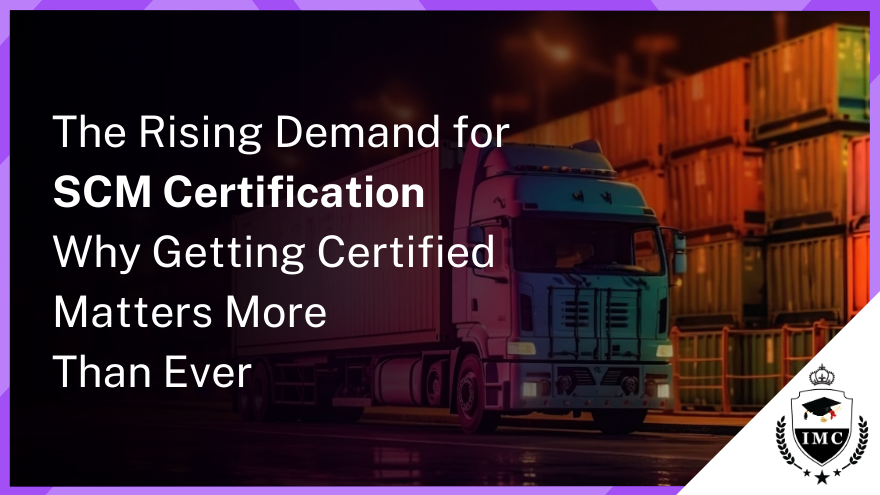In today's intensely competitive and dynamic business landscape, Supply chain management has become a pivotal strategic function and a key source of competitive advantage. As companies expand globally and supply networks become more complex, effectively managing the end-to-end workflow from procurement to final delivery is imperative, yet increasingly challenging.
Evolving customer expectations for fast, flexible and customized fulfillment along with trends like omnichannel commerce and mass customization are putting immense pressure on supply chains to be agile and efficient in real-time. Moreover, sustainability imperatives, geopolitical factors, regulatory compliance, talent shortages and rapid technological advances are reshaping modern supply chains.
To navigate these multifaceted pressures and optimize Supply chain performance, companies require professionals equipped with specialized expertise, practical skills and in-depth understanding of emerging best practices. This underscores the growing importance of supply chain certifications, which validate capabilities beyond just work experience. Let's take a deeper look at how Supply chain management certification are becoming essential for both individual career advancement and organizational success.
The Vital Role of Supply Chains
Supply chains include the end-to-end workflow to fulfill customer demand - from procuring raw materials to manufacturing, warehousing, order management and final delivery. Smooth supply chain operations minimize costs while providing satisfactory product availability and delivery times.
With omnichannel commerce and just-in-time business models, even minor disruptions can jeopardize sales, service levels and brand reputation. Hence companies invest heavily in recruiting and developing Supply chain talent.
McKinsey estimates that high-performing supply chains can achieve 2-3x revenue growth and 20-50% lower costs compared to industry averages. This underscores the vast business impact effective supply chain management can achieve.
New Pressures Reshaping Supply Chains
Various emerging factors underscore the need for robust Supply chain strategies today:
Globalization - Supply chains now extend across multiple geographies making coordination complex. Political scenarios, trade policies, currency changes etc. add risks.
- Technology - Automation, AI and data analytics are transforming supply chain planning, execution and control. Integration is required to maximize benefits.
- Sustainability - Circular economy laws, carbon footprint reduction goals and ethical sourcing standards have compliance implications.
- Customer Expectations - Demands for fast, flexible, customized and omnichannel fulfillment require supply chains to be agile.
- Smaller Batches - Trends like mass customization, direct-to-consumer selling, and personalized products necessitate flexibility.
- Talent Shortage - Finding professionals who can design, optimize and orchestrate modern supply chains is challenging.
Surging Demand for Certified Professionals
Industry surveys reveal logistics and supply chain management roles are among the most difficult positions for companies to fill. A Deloitte study found that unfilled supply chain jobs can cost businesses over $1 million annually.
Hiring managers prefer candidates who hold certifications because they validate understanding of essential concepts beyond just work experience.
Common Supply chain certification programs cover topics like:
- Logistics management - transportation, distribution, warehousing, material handling
- Sourcing, procurement and vendor management
- Inventory control, workload planning and forecasting
- Quality assurance frameworks like Six Sigma
- Legislation and compliance requirements
- Integration of emerging technologies like IoT, AI, robotics
- Sustainability through lean principles, waste reduction etc.
- IMC Institute provides structured certification programs in supply chain management, endorsed by industry bodies like CSCMP.
The online and classroom programs deliver required skills through videos, simulations, case studies and knowledge testing.
Career Growth and Salary Benefits
- Professionals certified in supply chain best practices are better equipped to add value from day one. They also progress faster into leadership roles.
- According to estimates from Supply chain management Review, certified professionals can earn 20-30% higher salaries compared to non-certified peers.
- Top performers can rise to supply chain director, VP or Chief Supply Chain Officer positions at the world’s leading brands, earning attractive six-figure compensation.
Summary
In summary, supply chains encompass the end-to-end workflow from procuring raw materials through production, warehousing and delivery. High-performing supply chains achieve dramatic revenue growth and cost reductions. However, new complexities like globalization, emerging technologies, sustainability, omnichannel commerce and smaller batches present challenges. The demand for certified professionals is surging as hiring managers prefer candidates with validated capabilities beyond just work experience. Structured certification programs teach essential concepts like logistics, sourcing, inventory control, quality assurance, compliance, integration and sustainability. Professionals certified in supply chain best practices progress faster in their careers and can earn 20-30% higher salaries. They are better equipped to take on leadership roles like supply chain director, VP or Chief Supply chain Officer at major corporations. As supply chain intricacies increase, the expertise gained through formal certifications will be pivotal for both individual success and company competitive advantage.






